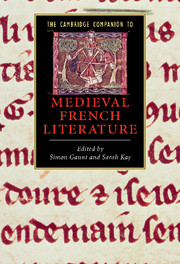Book contents
- Frontmatter
- Introduction
- Part I What is a Medieval French Text?
- Part II What is a Medieval French Author?
- Part III What is the Value of Genre for Medieval French Literature?
- Part IV How can we read Medieval French Literature Historically?
- 13 Feudalism and kingship
- 14 Clerks and laity
- 15 The marital and the sexual
- 16 Others and alterity
- Appendix: Reference works for Old and Middle French
- Bibliography of medieval French texts
- Suggested Further Reading
- Index
- Series List
13 - Feudalism and kingship
from Part IV - How can we read Medieval French Literature Historically?
Published online by Cambridge University Press: 28 March 2009
- Frontmatter
- Introduction
- Part I What is a Medieval French Text?
- Part II What is a Medieval French Author?
- Part III What is the Value of Genre for Medieval French Literature?
- Part IV How can we read Medieval French Literature Historically?
- 13 Feudalism and kingship
- 14 Clerks and laity
- 15 The marital and the sexual
- 16 Others and alterity
- Appendix: Reference works for Old and Middle French
- Bibliography of medieval French texts
- Suggested Further Reading
- Index
- Series List
Summary
The aim of this section dealing with historical themes is to consider how medieval French texts invite historical or historicizing readings and in this chapter the focus will be on feudalism and kingship. Indeed, the question of what kind of histories can be written from the literary evidence seems especially acute when we look to representations of political and social structures. After all, a society’s sense of its preoccupations does not invariably offer a secure guide to actual practices. Another difficulty with medieval French texts, especially those dating from the earlier period (on which this chapter will focus), is that their presentation of events is very often either partial or critical. Texts do not merely advance claims or accounts of events, they also question the ways in which such claims are made and legitimized.
Although they are often dealt with as separate themes, feudalism and kingship are both fundamental to conceptions of French identity, whether in relation to its myths of class structure, state formation, or legal and political institutions. This is especially true where the principles underpinning the two systems are seen to be in conflict. Terms associated with feudalism appear frequently in literary works, providing a language for exploring relations between the rights and dues owing to high-status individuals and for mapping out the consequences of actions in a dramatically compelling manner. Literary treatment of kings provides insight into how collective identities are founded and shaped, into the strains and conflicts created by the desire for, or imposition of, unity. One central example is the term franc, which, in that it means both 'Frankish' and 'free-born', combines both status and ethnicity.
- Type
- Chapter
- Information
- The Cambridge Companion to Medieval French Literature , pp. 197 - 209Publisher: Cambridge University PressPrint publication year: 2008



